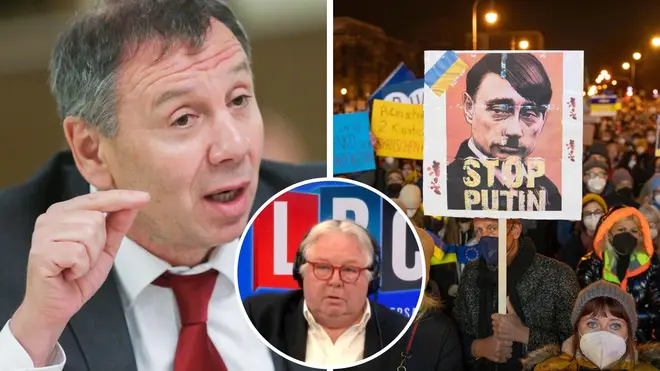
Paul Brand 10am - 12pm
3 March 2022, 09:41 | Updated: 3 March 2022, 09:47

Ex Putin spokesman says Russian invasion of Ukraine is 'liberation'
A former spokesman of Vladimir Putin today spoke to LBC where he tried to depict Russia's invasion of Ukraine as a 'liberation'.
Sergei Markov said the war will only end when "two thirds" of Ukraine has been seized by Russia and a new government installed.
Mr Markov was asked why Putin had been cited for war crimes after attacks on civilian targets. He said it was because Western countries were trying to depict Russia as a “repressive” regime.
Nick Ferrari asked Mr Markov at Breakfast on LBC today: “How do you see this war ending?”
“This war will end after Russia liberates two thirds of Ukrainian territory from the Neo-Nazi repressive regime… and a new government will be formed," came the reply.

The interview highlights senior Russian figures' efforts to disguise and obfuscate what is happening on the ground in Ukraine.
His comments come hours after huge strikes rocked the capital Kyiv with reports of missiles hitting the city's train station, where civilians had gathered in large numbers trying to flee the city and head west.
The UN human rights office has said 227 civilians have been killed and another 525 injured in Ukraine since Russia's military invasion began a week ago.
The office of the UN High Commissioner for Human Rights said the tally eclipses the entire civilian casualty count from the war in eastern Ukraine between pro-Russian separatists and Ukrainian forces in 2014 - which left 136 dead and 577 injured.

'No, no, no, no, no, no.'
The rights office admits that the figures so far are a vast undercount because it uses a strict methodology and counts only confirmed casualties. Ukrainian officials have presented far higher numbers.
Most of the casualties were caused by the use of explosive weapons with a wide impact area, including shelling from heavy artillery and multi-launch rocket systems, and air strikes, it said.
Earlier, the UN refugee agency said one million people have fled Ukraine since Russia's invasion, in the swiftest exodus of refugees this century.
The tally from UNHCR amounts to more than 2% of Ukraine's population on the move in under a week. The World Bank counted the population at 44 million at the end of 2020.
The announcement came as Russian forces laid siege to two strategic Ukrainian ports and pressed their bombardment of the country's second-biggest city, while the huge armoured column threatening Kyiv appeared to be stalled outside the capital.
Moscow's isolation deepened, meanwhile, when most of the world lined up against it at the United Nations to demand it withdraw from Ukraine.
And the prosecutor for the International Criminal Court opened an investigation into possible war crimes in Ukraine.
A second round of talks aimed at ending the fighting was expected on Thursday between Ukraine and Russia, but there appeared to be little common ground between the two sides.
UNHCR, meanwhile, predicted up to four million people could eventually leave Ukraine but warned even that projection could be revised upwards.
In an email, UNHCR spokeswoman Joung-ah Ghedini-Williams wrote: "Our data indicates we passed the 1M mark" as of midnight in central Europe (11pm London), based on counts collected by national authorities.
UNHCR spokeswoman Shabia Mantoo said on Wednesday that "at this rate" the exodus from Ukraine could make it the source of "the biggest refugee crisis this century".
Russia reported its military casualties for the first time since the invasion began last week, saying nearly 500 of its troops have been killed and almost 1,600 wounded.
Ukraine did not disclose its own military losses but said more than 2,000 civilians have died, a claim that could not be independently verified.
With fighting going on on multiple fronts across the country, Britain's Ministry of Defence said Mariupol, a large port city on the Azov Sea, was encircled by Russian forces, while the status of another vital port, Kherson, a Black Sea shipbuilding city of 280,000, remained unclear.
Russian President Vladimir Putin's forces claimed to have taken complete control of Kherson, which would make it the biggest city to fall yet in the invasion.